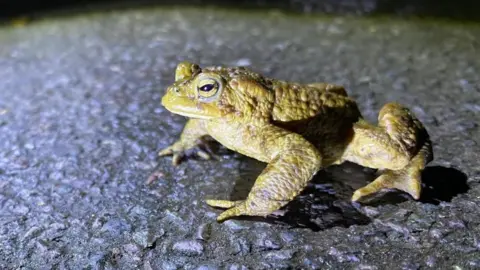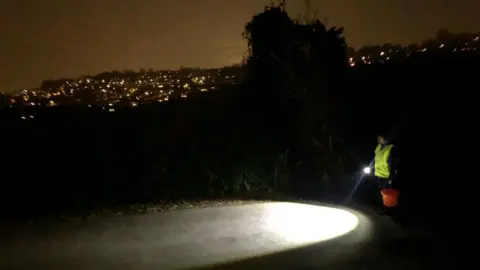Toad patrol helps 50,000 to breeding grounds
 Charlcombe Toad Rescue
Charlcombe Toad RescueA toad patrol group is celebrating after successfully helping 50,000 amphibians reach their breeding grounds over the past three decades.
The Charlcombe Toad Rescue Group hopped to the aid of nearly 4,000 toads, frogs and newts as they crossed Charlcombe Lane, near Bath, during this year's migration season alone.
A 0.5 mile (0.8km) stretch of the road has been closed for six weeks between February and March each year since 2003 to prevent the migrating toads from being squashed by traffic.
About 50 volunteers go on patrol each night and have spent more than 600 hours a year helping amphibians make the crossing.
The group has been closing the road in agreement with Bath and North East Somerset Council for more than 20 years. It is one of only four closures of its kind in the country.
Chris Melbourne, who manages the collection of data for the Charlcombe Toad Rescue said it had been a "game changer" for the local amphibian population.
He said reaching the milestone of helping 50,000 amphibians could not have been done without the support of nearby residents.
Before the closure of Charlcombe Lane, the casualty amphibian casualty rate during mating season was 62%. In 2025, it was 3%.
 Charlcombe Toad Rescue
Charlcombe Toad RescueThere was an exciting first for the rescuers in 2025, with a Great Crested Newt spotted for the first time the group's history.
The volunteers take every precaution to escort the migration, using latex-free, powder-free gloves so as to avoid any chemicals from their hands harming the amphibians.
The group says changes in the climate make it harder for the group to keep of the toads.
Mr Melbourne said it was becoming "increasingly difficult" to predict the peak times for amphibian movements.
"Closing the road for six weeks makes such a difference," he added.
Follow BBC Bristol on Facebook, X and Instagram. Send your story ideas to us on email or via WhatsApp on 0800 313 4630.
